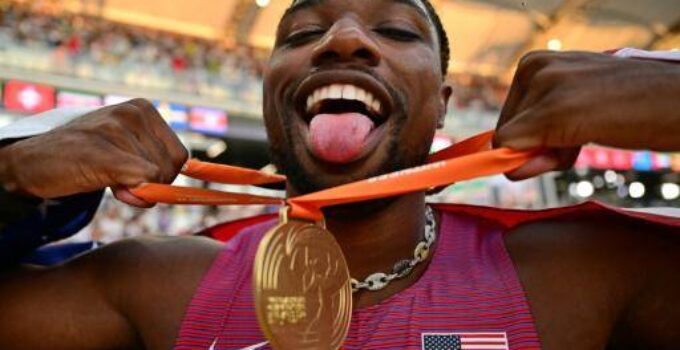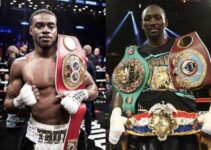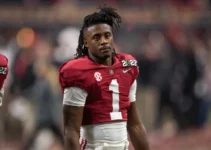In the aftermath of his remarkable victories at the World Athletics Championships in Budapest, 26-year-old American track and field star Noah Lyles raised an intriguing question that sparked a lively discussion across social media platforms and sports circles.
At a press conference following his victories, Lyles expressed his thoughts on the title of “world champions” often bestowed upon winners of the NBA finals. He pondered the implications of this title, pointing out that the NBA champions are recognized as “world champions” despite the fact that basketball’s international representation is not as vast as some other sports.
Lyles eloquently conveyed his viewpoint, emphasizing that while he loves the United States, he believes the “world champion” label should encompass a broader global perspective. He contrasted this with his sport, track and field, which features athletes from a multitude of countries proudly representing their flags on the international stage.
The response to Lyles’ comments was swift and varied. Prominent figures such as Kevin Durant and Drake shared their opinions on social media, sparking a wider conversation on the topic. One sports journalist, Gary Al-Smith, noted that many non-Americans share Lyles’ sentiments.
Al-Smith highlighted that the NBA’s reputation as a global league, featuring top players from around the world, might contribute to the notion of the NBA champions being considered “world champions.” However, he expressed his personal perspective as a sports journalist, stating that the traditional understanding of a “world championship” involves participants from different countries competing.
This discussion also provides a lens through which to explore the concept of American exceptionalism within the realm of athletics. American exceptionalism, often associated with the idea that the United States possesses unique qualities or abilities, can influence athletes’ self-confidence and the way they approach their respective sports.
American athletes might carry a sense of assurance based on the belief that excelling in their home country translates to global excellence. This attitude, rooted in national pride, can lead to a perception that American achievements are automatically reflective of worldwide success. However, as Al-Smith pointed out, the definition of a “world champion” should ideally involve a wider array of nations vying for the title.
Lyles’ plea for the track and field community to exhibit its inclusiveness on a worldwide platform showcases a desire for heightened acknowledgment and representation. Although the NBA adopts the title of “world champions,” reflecting its international array of players, Lyles’ standpoint serves as a prompt to consistently review the vocabulary and designations employed in the sports domain.
In summation, Noah Lyles’ stimulating observations concerning the “world champion” label attributed to NBA victors have triggered a broader dialogue on the concept of American exceptionalism within sports.
This exchange of ideas presents an opening to explore the crossroads of sports, culture, and language, propelling us to reconsider how we define global accomplishments in the realm of athletics.




